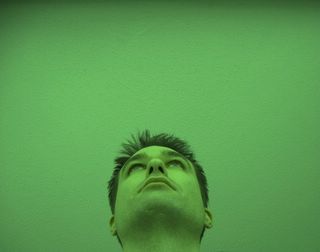
Up in a trailer park on the shores of a lake more modest than nearby Mille Lacs, in a 1987 silver Airstream camper nestled under a canopy of fir trees, lived Warren Futgers, nicknamed the Professor. He was not a college professor. He had never even been a high school teacher. He held no degrees that anybody could speak of. Yet he carried himself like an educated man, one taken to long hours of contemplation on his lawn chair with frayed nylon seat and plastic armrests smudged with newspaper ink. He spoke rarely but when he did, he held your interest. He had an easy way of speaking and a tone of voice that was comforting and reasonable, so that you found yourself frequently saying things like, “Yes, I see. That makes sense. I never thought of that before, but now that you mention it, I suppose so.” His hair was long and stringy, balding at the temples, and he grew his beard until it touched his chest, then he would shave it all off and start over again.
The Professor didn’t read the Sunfish Times like the other locals, instead subscribing to papers from London, New York, and Boston. He read his newspapers seated in his lawn chair from early morning until lunchtime, drinking tea from an insulated mug roughly the size of a bait bucket and brandishing the name of a local gas station. Then he folded up his papers, slapped them against his knee while he looked out towards the lake, and retreated to his trailer.
His trailer was filled with books; nineteenth century novels, historical biography, herpetology, travelogues. Herbs grew in miniature pots, and creeping plants wound their way across drapery rods and down from shelves. His kitchen countertop was a clutter of experiments and specimens: ant farms, honeycombs, caterpillars spinning cocoons in jars with air holes nailed through tin lids. The place smelled strongly of curry; he used it nearly everything he cooked.
He was one of those solitarians that rarely wandered over to say hello unless officially invited for a potluck or a drink, so his neighbors frequently came over for a visit when they saw him out in the lawn chair. Kids knocked on his screen door in the afternoons to hear stories of distant places, mythological heroes and villains, arctic explorers and Indian chiefs.
He owned a canoe with a hole in the bow that restricted him from ever having another person in the canoe; only by sitting alone in the stern would the distribution of weight raise the bow high enough above the waterline to stop water from leaking in and sinking it. He didn’t go out much on his own, but he did take you up on a sunset boatride on a pontoon if invited, and he particularly enjoyed rides in the Culverson’s speedboat. He’d sit up in the bow with his hair and beard whipping in the wind, sunglasses shielding his eyes but tears driving horizontally across his cheekbones from the rush of air.
Then one morning, he was gone.
Where’s the professor; did he go into town? Did he leave to visit a dying family member? Is his mail getting forwarded? Nobody had a clue. The children whined and asked their parents to tell them stories, but they were never as good as the Professor’s. People missed seeing the glow of his light at night, warming the shadows beneath the pine trees into the early morning hours. Now the woods seemed particularly dark and menacing, as though a guardian had abandoned his post. When the sheriff’s department dragged the lake, they found his canoe sunk in about twenty feet of water, but no sign of a body.
The kids of the trailer park came up with their own theories: the professor had finally found a canoe partner, but the moment of his delivery from loneliness had resulted in his drowning. Who would it have been? "It was the ghost of Pocahontas." "No way, it had to be a mermaid." One boy offered the theory that it was an escaped serial killer had broken into his trailer and demanded they paddle across the lake to get away from the cops.
The adults’ theories were no more plausible than the children’s. Maybe he was a felon and staged his death. Maybe he was an insider trader with all of those big city papers and struck it rich and left without so much as a goodbye. Maybe he was out on lake in the middle of the night and got abducted by aliens.
Everybody waited for him to show up again, either floating face down out by the docks, or strolling into the park with a fresh mug of tea and no explanation for his absence, but the truth is, he never showed up again, and they eventually had to tow away his trailer.


